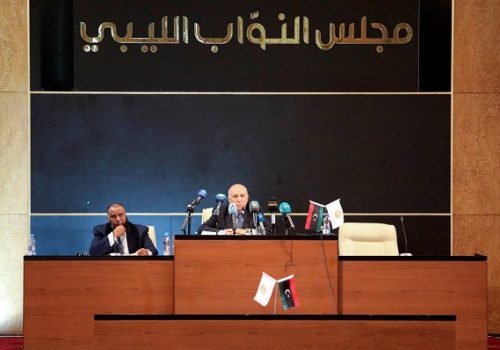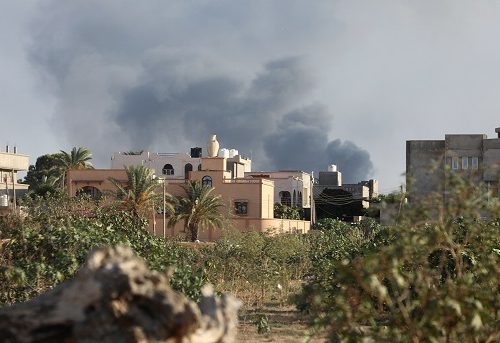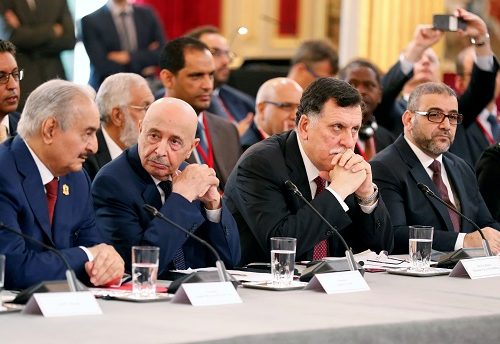Libya: Locked or moving forward?
One of the unfortunate consequences of Libya’s crisis is that the main players with decision-making power in Libya’s conflict are the regional and international powers involved in the crisis. Therefore, an international conference organized with the precise purpose to reach an agreement that satisfies most of the external actors’ interests could help move the country toward a process of stabilization and peace.
The international community seems intent to proceed according to the following plan: a meeting of the main international actors at the margins of the United Nations General Assembly meeting in late September. This would be organized by France with the purpose to create the conditions for a convergence of minds among all the actors interested in a solution to the Libyan crisis. This meeting will be followed by a high-level international conference organized by Germany for the second half of the month of October. In Berlin a real and effective consensus on a new road-map and a commitment to adhere to it will be reached, and the effects of this agreement will rapidly spill-over to the internal Libyan situation.
Problems with the international plan
The success of such a process is highly improbable unless a critical change occurs on the ground, in the battlefield that sees the forces of General Haftar’s Libyan National Army (LNA) opposing those loyal to the Government of National Accord (GNA) led by Fayez Serraj in Tripoli.
A victory, even a small one, by one side will be decisive to alter and possibly change the positions of the powerful international actors.
As an example, the defection of the militias of the city of Tarhuna, which so far have sided with the attacking forces of Haftar and carry an important weight in the strategic disposition of his forces, could infer a fatal blow to the LNA and force it to withdraw from its positions in front of Tripoli.
This fact, if it were actually to occur, would initiate a self-inquiring analysis by foreign supporters of Haftar that may lead them to reduce their support for him and either try to substitute him as the leader of the LNA, or force him into new negotiations to at least save face and limit the damages. Without such a change, the opposing forces—despite a stalled military situation—are still convinced that a military victory is possible and thanks to their foreign support, are more and more intent to obtain that result.
…the opposing forces—despite a stalled military situation—are still convinced that a military victory is possible…
Thus, without a critical event on the ground that breaks the stalled position of the opposing forces, it will not be possible to unlock the situation, which may become endemic and last for a long and destructive time.
It is a Catch-22 situation in which foreign actors, even if conscious of the unlikelihood of a military solution, have to continue to support their proxies’ fight if they don’t want to lose the battle entirely. At the same time, the situation can be unlocked only by a change of mind of any of the foreign actors involved. In other words, it would require a change of sides—by one or more of the actors critically involved in the Libyan theater—to obtain the change on the ground that could lead to a new consensus among international actors to begin meaningful negotiations leading to a solution for the embattled country.
Related Reads
It is possible that even in the absence of a critical event happening, the international actors reunited in Berlin could find a way to mediate, openly or secretly, their interests in Libya and reach an agreement. It is a possibility, but a farfetched one. Nothing has changed from the days:
- of the French conference in Paris in May 2018
- or the Italian one in Palermo in November 2018
- or the one in Rome in 2014.
It is difficult to see why Berlin should be any different.
What is the likelihood that foreign supporters of Haftar or Serraj change their positions?
For the external supporters of the LNA, all it would take is to realize that Haftar does not represent the “Bonapartist” solution attributed to him by many of his supporters and opinion-makers. He is not the spokesperson for secular values as the dominant narrative would like him to be, to the contrary, Salafists occupy a primary position in his army and are intent to spread and apply their values throughout the Eastern Province. His record also shows a lack of military skills. It took the LNA years to defeat what Haftar called “terrorists.”
These groups are comprised of members of Islamist brigades, Muslim Brotherhood sympathizers, and families of those who oppose Haftar’s rule. It took him more than a year of hard siege and bombardments to capture Derna, which according to him was a “sanctuary” of Islamist terrorists. The debacle on the outskirts of Tripoli speaks for itself. Moreover, he could hardly be considered a strong opponent of radical Islam since he never engaged the Islamic State (ISIS) during the group’s occupation of the central city of Sirte, leaving the hard and bloody task of liberating the city to the militias of Misrata.
He is certainly not a democratic pluralist leader, as evidenced by his appointment of military governors in all villages or cities that fell under his control. There are many flaws in the forces of the western region and in the GNA, no doubt, one has only to look at the terrible situation of the city of Tripoli literally submerging in garbage. However, the possibility to move beyond the confines of the civil war and enter a new progressive phase is stronger in the western region within the contest of the Libyan Political Agreement and the other UN recognized institutions.
The role of Italy
An important role in this moment could be played by Italy. The Italian Premier Giuseppe Conte should resist the innate Italian propensity to change bets on the winning horse in mid-race and thus switch its support from Serraj to Haftar. Even his statement given in April 2019 that Italy will side “neither with Serraj nor with Haftar but with the Libyan people,” reiterated during a meeting with Serraj on September 18, 2019, is too ambiguous and practically meaningless It is hard to see how Italian interests in Libya could be better served by being the sixth supporter of Haftar rather than being the number one supporter of the GNA. On the one hand, siding with Haftar even in case of his victory would see Italy lagging behind Egypt, UAE, France, and others; while in case of the GNA’s victory, Italy would be first in line. At the same time, not taking a definite position will produce the same results as siding with Haftar. This is no trivial detail.
At the same time, not taking a definite position will produce the same results as siding with Haftar.
The Italian government should throw its political and diplomatic weight more decisively and effectively in support of the forces aligned with the GNA. It should insist on the illegality and brutality of Haftar’s troops’ attack against civilians and the indiscriminate targeting of health personnel.
It should advocate in every forum from:
- the UN
- to the EU
- to the Arab League
- and the African Union,
the position of the GNA as the attacked party and the incorrectness of equating the position of the GNA with that of the LNA, the aggressor.
Italy should be first in line to demand that the UN or NATO act more decisively to protect civilians, hospitals, and the crumbling infrastructure. It should go all the way to demand that the UN establish a presidium at the airport of Mitiga—repeatedly bombed by the LNA air force—to deter further bombardments and by guaranteeing its exclusive utilization by civilian airlines only.
This strong and defined position, while enhancing the influence and the prestige of Italy among Libyans, may, unfortunately, expose the Italian hospital in Misurata to retaliatory attacks by Haftar’s air force. Italy should make clear that an attack against the hospital will be met by any possible retaliatory operations.
Seeking a diplomatic path
There is also the possibility that an increased Italian involvement may induce an increase in the pro-Haftar support from Egypt, the UAE, and France and thus achieve the opposite result than the one sought. By acting only at the diplomatic and political level, the Italians maintain the appearance of respect of international laws and procedures that the others have lost.
Were increased Italian involvement to draw a retaliatory response from Haftar’s international backers, they would be exposed before the whole world.
This public embarrassment would be felt in different degrees by Haftar’s supporters, highest in a democratic system like France and lowest in an authoritarian one like the UAE, but still enough to hurt. Moreover, the Italian position proposed will further weaken the validity of the pro-Haftar narrative of the bad Islamists in Tripoli vs the good secularists in Benghazi, since it would be ridiculous to accuse Italy (unlike Qatar and Turkey) of supporting Islamist groups and defending the application of Sharia in Libya.
Acting in this way, Italy could strengthen the GNA and thus increase the doubts and second thoughts that are occurring in the capitals of the state supporters of Haftar. Another good reason for a deeper Italian engagement is that by its stronger presence in the Tripoli area it can become the guarantor of the absence of radical Islamist fighters and groups among the fighting forces thus enabling a change of narrative in important supporters of Haftar such as the UAE.
Given this guarantee furnished by a western country the political elites of the UAE may feel more secure in their fight against Islamic radicalism and, by accepting the assurances that there are no Islamist forces, could accept a new narrative that would allow for a dialogue with the opposing countries and further the chances of undertaking a successful negotiation.
Moving Forward
The defeat and withdrawal of LNA troops is just the first, albeit essential, step for the initiation of a process to stabilize Libya. On this note, another point should be considered, that of the suitability to the task of the institutions emanated from the Libyan Political Agreement (LPA). It is probable that after a victory against Haftar’s troops, the winners in Tripoli would demand a different government, one that reflects the new balance of power in the region.
A reform of the GNA is made possible by a modification of the LPA. A perspective discussed frequently in Tripoli these days, is the appointment of a high-level personality, such as the president of the highest court, as caretaker at the top of the State.
A new National Unity Government, which should include personalities from all regions and sectors of the country, should be appointed. This interim executive should undertake a few well-defined tasks including the administration of the main cities, reconstruction of the civil infrastructure especially hospitals and schools, and provision of a satisfactory level of security throughout the country so as to allow the holding of elections, and the establishment of legitimate and representative institutions.
All of this is open to debate and will be the center of discussions among Libyan actors once the first decisive step of the demise of Haftar and the withdrawal of his troops from the Tripoli region is accomplished.
Karim Mezran is a resident senior fellow with the Council’s Rafik Hariri Center for the Middle East.
Image: Men walk in front of Rixos hotel damaged by a rocket in Tripoli, Libya May 24, 2019. REUTERS/Goran Tomasevic


